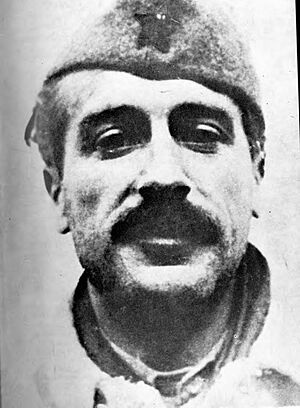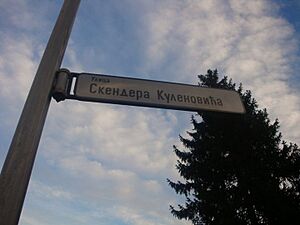Skender Kulenović facts for kids
Quick facts for kids
Skender Kulenović
|
|
|---|---|

Kulenović in 1943
|
|
| Born | 2 September 1910 Bosanski Petrovac, Bosnia and Herzegovina, Austria-Hungary |
| Died | 25 January 1978 (aged 67) Belgrade, SR Serbia, SFR Yugoslavia |
| Occupation | Writer |
| Nationality | Austro-Hungarian, Yugoslav |
Skender Kulenović (born September 2, 1910 – died January 25, 1978) was an important Bosnian writer. He wrote poems, novels, and plays. He is remembered for his powerful words and his role during a challenging time in history.
Contents
Early Life and Education
Skender Kulenović was born in 1910 in Bosanski Petrovac. This town was then part of the Austro-Hungarian Empire. His family was a wealthy landowning family in Bosnia.
However, in 1921, his family lost much of their wealth. This happened because of new land laws in the Kingdom of Yugoslavia. They then moved to Travnik, his mother's hometown. Skender finished high school there at a Jesuit school. He wrote his first poems during this time. A collection of his sonnets was published in 1927.
After high school, he went to Zagreb to study law. While there, he became interested in ideas about making society fairer. He joined groups like the League of Communist Youth of Yugoslavia in 1933. He later joined the Yugoslav Communist Party in 1935. He decided to stop studying law to focus on his writing. In 1937, he helped start a journal called Putokaz (Signpost). This journal was a place to talk about important social issues.
Around 1939 or 1940, Skender Kulenović left the Communist Party. He had different ideas from the party leaders. This made it harder for him to publish his writings. In 1940, he married his first wife, Ana Prokop.
World War II and Writing
When World War II started in 1941, Yugoslavia was invaded. Skender Kulenović was still in Zagreb. He joined the Partisans, a group fighting against the invaders. He moved to the Bosanska Krajina region.
During the war, he continued to write. He edited newspapers like Krajiški partizan and Oslobođenje. He also gave speeches. He encouraged people to fight for freedom. He also spoke about the importance of different groups, like Muslims and Serbs, working together.
Some of his most famous poems were written during this time. These include Stojanka majka Knežopoljka (1942), Pisma Jove Stanivuka (1942), and Ševa (1943). The poem Stojanka majka Knežopoljka is about the pain of a mother. She lost her three sons during a difficult battle called the Kozara Offensive. Other poems, like Pisma Jove Stanivuka and Ševa, showed the bravery of people fighting for freedom.

Post-War Career and Later Works
In 1945, after the war, Skender Kulenović became the Drama Director. This was at the National Theatre in Sarajevo. He married his second wife, Vera Crvenčanin, who was a film director.
In the years after the war, he focused on plays and journalism. He wrote several successful plays. He also wrote short stories, essays, and poems. He edited different literary journals. His comedies, Djelidba (The Division) and Večera (The Dinner), talked about social differences. These topics were sometimes difficult to discuss openly at the time. Because of his independent views, he later moved to Mostar.
In 1959, he published “Stećak.” This was the first of his forty Sonnets. He also traveled to Egypt. This trip inspired some travel writings and later a sonnet called Vaze (Vases). In 1968, the first twenty of his Soneti (Sonnets) were published. The second set, Soneti II, came out in 1974. His novel Ponornica (Lost River) was published in 1977.
Skender Kulenović passed away in Belgrade in January 1978.
His Lasting Impact
Skender Kulenović's life shows the mix of cultures in the Yugoslav era. He was born into a Bosnian Muslim family. He was educated in the Catholic tradition. He lived in the Serbian capital.
His ideas were about people from different backgrounds in Yugoslavia working together. His writing also drew from different traditions. These included Ottoman, Croatian, and Serbian influences. Some people try to label him as only a Bosniak or only a Serbian poet. However, many believe this does not fully capture his importance. His work is a shared part of the heritage of Serbs, Croats, Montenegrins, and Bosniaks.
Historians like Pål Kolstø say that Kulenović, along with other writers, had a strong Yugoslav identity. This makes it hard to put their works into just one category. His writing truly belongs to everyone in the region.
See also
- List of Bosnians

